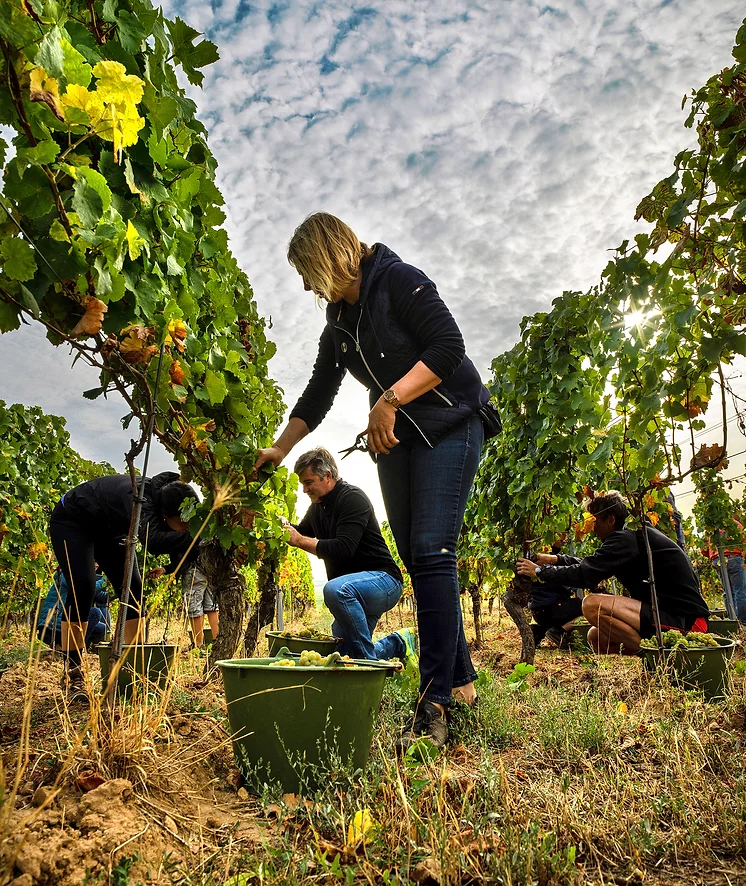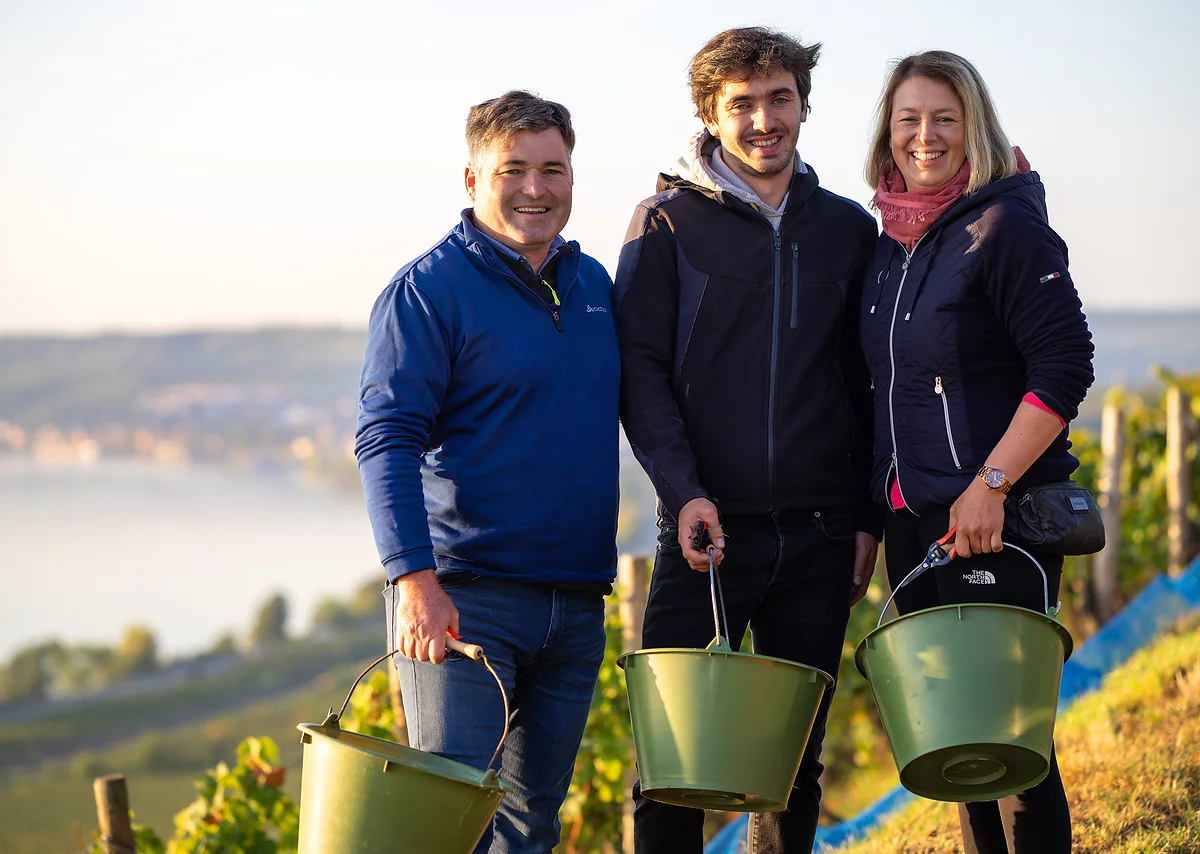
Dear wine friends,
We greet you all warmly from Flörsheim-Dalsheim. As is tradition, we spent the first days of the new year tasting the 2021 vintage out of barrel with the whole family and we have good news: 2021 brings a lot of energy and joie de vivre into the glass—truly a vintage we can all look forward to!
2021 is also a particularly special year for us because exactly 100 years ago, our great-great-grandfather Georg Keller III first bottled wine, beginning a new chapter for our family. On the occasion of our anniversary, we would like to take you on a journey into the past, during which you will learn a lot about our family history and the Hubacker. “Tradition is not the worship of ashes, but the passing on of fire.” This quote, from the French historian and politician Jean Jaurés in 1910, describes our relationship to tradition very well as Felix, the 10th cellar generation, is involved in our family winery. Supported by a passionate team, we do everything we can to practice top-class, cross-generational, sustainable viticulture. It is a great gift and anything but a matter of course when the next generation develops the same passion for what their parents and grandparents have already built up. So we are very happy and grateful!
Protect what is important to us
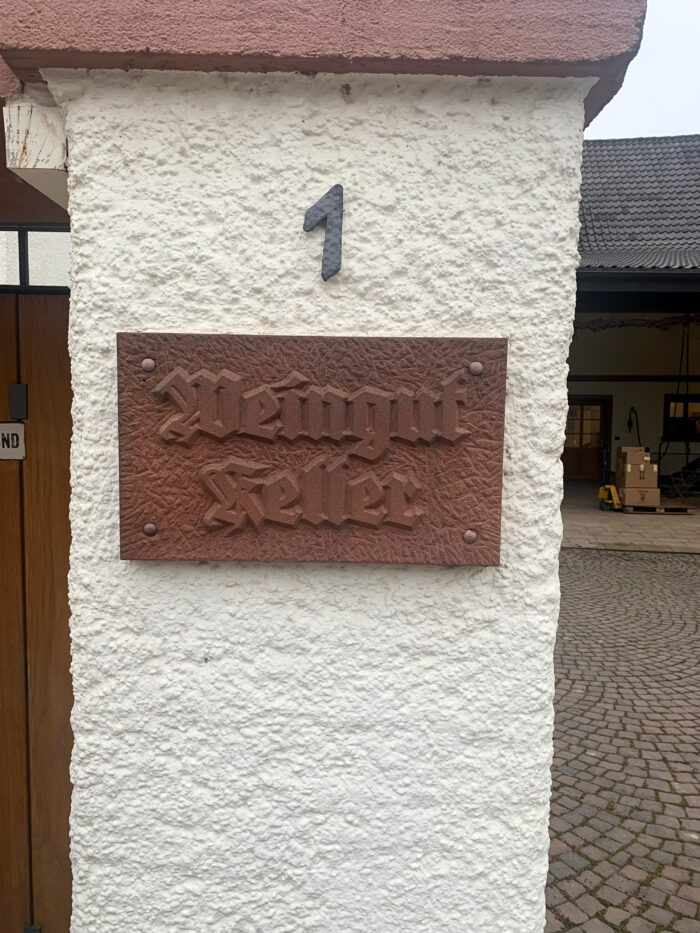
Family businesses tend to think long-term and sustainably, and that has always inspired us. Since 2021 we no longer heat our winery with fossil fuels, but with renewable raw materials. Our goal for 2022 is to generate our energy as self-sufficiently as possible with a photovoltaic system. In the vineyard, we rely on dense plantings, which enable the vines to penetrate even deeper soil layers in order to better survive the increasingly dry years. We rely on self-made composts that activate soil life and we make our own preparations for plant protection and plant strengthening. The natural stone walls we rebuilt in the vineyards create fascinating habitats for salamanders and insects, but wild flowers and herbs also grow magnificently there. Bee colonies, honey from wild flowers, fresh eggs from our chickens and our fruit and vegetable garden provide us almost everything our heart desires. Enjoying fresh products straight from our own garden every day is simply our greatest luxury.
The path we took many years ago would not be possible without you, dear wine friends. With your love and passion for wine you have been supporting us for years and some even for decades. Thank you.
100 years of “pure happiness in a glass”
Sustainability is not a new term for us winemakers, but part of our DNA. We must align our actions with a vision towards the coming decades or even centuries. Our family business was founded in 1789 in Flörsheim-Dalsheim with a decision made for the future, and this was also true for our ancestor Georg III bottling his first vintage from the “Oberen Hubacker” 100 years ago. “Viticulture is not difficult at all, only the first 100 years are difficult,” Paul Pontallier, the legendary estate manager of Château Margaux, once remarked with a wink. The path that our winery has taken from the first bottling to the present day shows that there is truth in his statement.
Georg Keller III spoke of “gold in the glass” when he bottled his first Riesling and Gewürztraminer from the 1921 vintage. Our great-great-grandfather was a soulful winegrower, which was extremely important even back then, as after the First World War farming was anything but easy: high reparation payments had to be made, the Spanish flu was in full swing, an economic recession, and inflation was up. So it was all the more important to our great-great-grandfather that something valuable and durable was produced from the particularly calcareous soil in the Upper Hubacker.
In these troubled times, he wanted to create something that could last for generations. Parts of the harvest were sent by rail in small barrels of 120-180L. But these deliveries came less and less frequently during the war years between 1914 and 1918. He had to come up with something and nature gave him a sign from heaven with the 1921 vintage. A hot summer resulted in fully ripe grapes and fantastic autumn weather crowned the vintage.
The refractometer showed a sensational 114°Oechsle at harvest and the grapes tasted “powerful and noble.” In the early summer of 1922, the entire Keller family bottled the wine together, labeling the bottles and packing them in straw tubes. George III delivered from the winery and from then on, they would then take them to the customers themselves in heavy wooden crates. With that, George III laid the foundation for what the Keller winery is today.
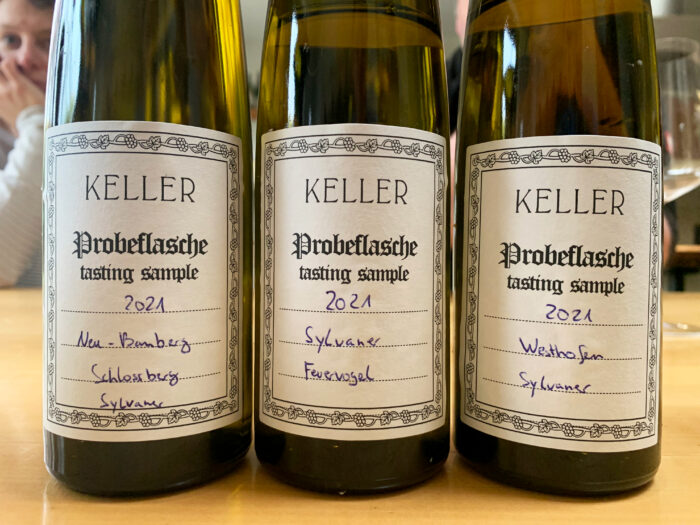
2021: Back to the future
100 years after the first bottling and 50 years after the 1971 wine law, the Hubacker returns to its original name with the 2021 vintage: “Oberer Hubacker.” With the 2021 vintage, this vineyard designation will be printed on the labels again as a monopole of our family. Felix, the 10th Keller generation, started this initiative and implemented it successfully. Even 100 years ago, names of sites on the label were reserved for a small elite of fine wines. With a particularly good sip from the Oberer Hubacker we toast Georg III and all generations are sure to happily toast us from above!
The 2021 vintage was a late bloomer. March and April remained cool and with luck we were spared from the frosts that affected so many. Flowering was delayed by almost three weeks compared to the previous year and the rains came in June, which our vines urgently needed after four very dry years.
Seventeen rainy days in June with almost 120mm of precipitation were on the one hand a blessing for vines, garden and our fruit trees, yet on the other hand the frequent rainfall meant high fungal pressure and an outbreak of powdery mildew infestation with very small windows to work between the rains – we worked during the week and often all through the weekend. When the pleasant summer temperatures came, the vine growth seemed to explode so we had even more work.
In July the German Weather Service warned of “extreme storms” and “continuous rain” in Rhineland-Palatinate and North Rhine-Westphalia and we were very worried. 108 mm of precipitation in just one day; we worried about strong erosion in the vineyards and further increased fungal pressure on the vines. Nature really demanded a lot from us in June and July, the heavy rain of 14 July narrowly missed us, but hit parts of North Rhine-Westphalia, the Eifel and the Ahr with full force. Not only houses, but bridges and vineyards were destroyed by an avalanche of mud and water and in a tragedy that we are still trying to understand, 134 people died on that day in the floods of the Ahr. When the scale of the disaster became apparent, we drove to our friends in the Ahr, equipped with generators, pumps, hoses and shovels. This was an experience that none of us will ever forget—it makes us appreciate with humility and gratitude what was given to us with 2021 here in the hill country of the Rheinhessen.
In addition to a lot of water, June and July fortunately also brought a lot of sun. Both months were well above August in the sunshine hours, which was too cool, but also dry. Compared to the previous year, we were three to four weeks behind in the vegetation cycle at this time and knew that we would only achieve excellent qualities with small yields and continued good weather.
The cooler August days and nights increased the chances of particularly aromatic grapes and musts. Finally, a sunny September initiated the last ripening phase of our grapes. We had a glorious end to the summer; the good water supply of the vines in combination with the cool August and September nights, gave us hope for particularly fine aromas. A summer in September did the winegrower’s soul well after all the challenges of the year so far. The grapes hung loose and healthy on the vine when the harvest started in mid-September, about two weeks later than in 2020.
We harvested the first Pinot Noirs in Bürgel and Morstein, and the higher-lying Frauenberg followed a little later. The weather was almost perfect. Small showers in the middle of the month were followed by ten dry and sunny days, in which we were able to bring in excellent qualities
The hard work we put in throughout the year paid off. In 2021 it became clear once again why the work of the winemaker in the vineyard is included as an essential factor in the meaning of the term TERROIR. Dear wine lovers, you never only taste the vintage, the location, the soil, but always also the people who cultivate the vines throughout the year with a lot of dedication and passion.
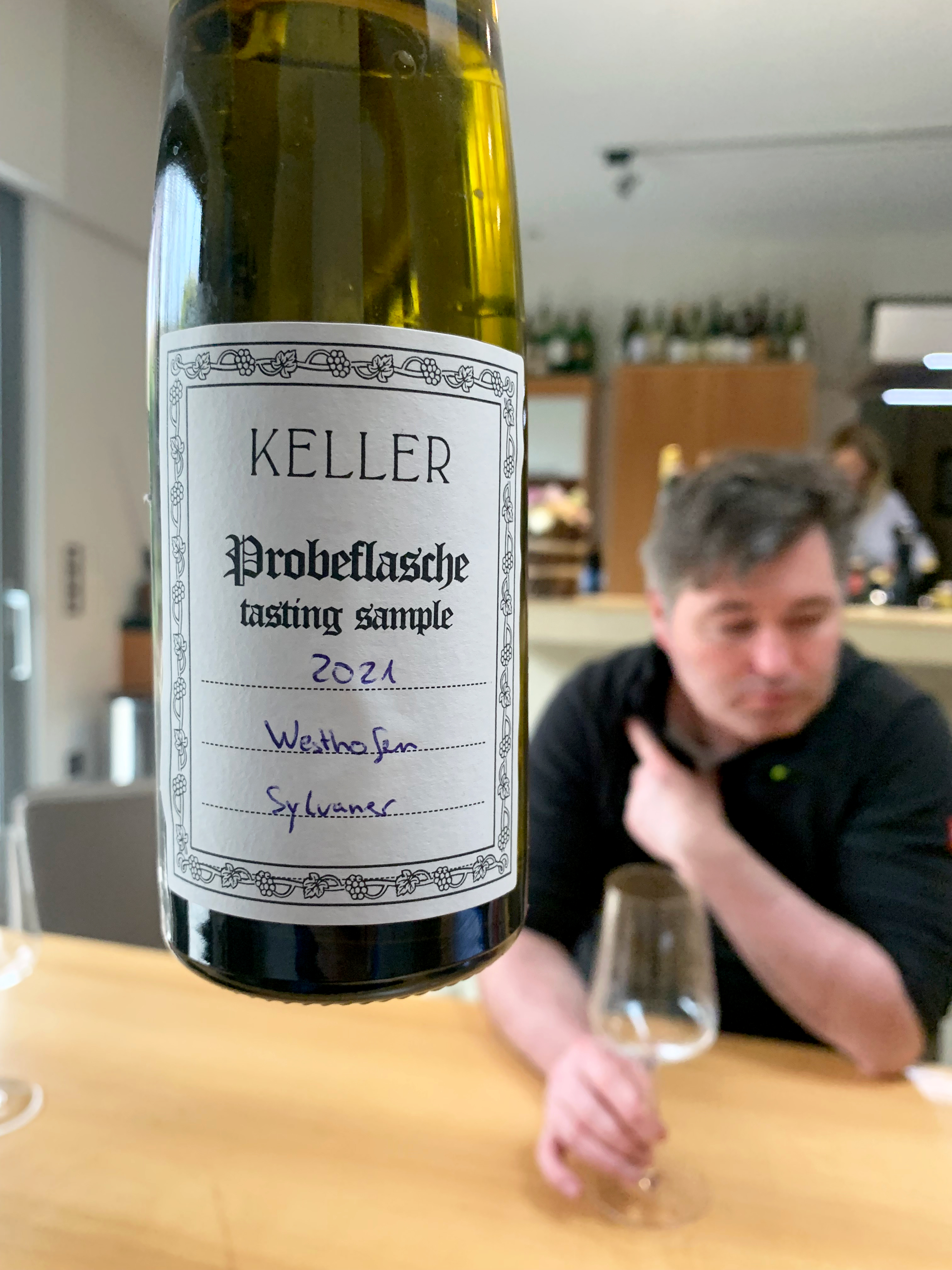
We began with the Silvaner harvest at the beginning of October; we hold this Rheinhessen variety, Silvaner, in very high esteem. For 2021 the harvest was small in yield, yet very high in quality. From the estate wine to the Silvaner “Feuervogl” you can taste a lot of Rheinhessen soul in the glass. Fine herbs, salty, multi-layered aromas: we had goosebumps when tasting the barrel samples.
When great-great-grandfather Georg bottled the first cellar wines in 1921, the Kabinett (or cabinet at that time) was on everyone’s lips as the epitome of elegance and uniqueness of German wine all over the world. Whenever it comes to harvesting the first Riesling grapes for our Kabinetts in autumn, everyone in the team shines. Not only because when snacking on the grapes we imagine the aromatic explosion and the kick of freshness that awaits you in the cellar, but also because the team knows that in the evening some particularly good bottles are opened to toast the new harvest year.
But the more our climate changes, the greater the challenge it is for us to get Kabinett in the bottle with perfection. “The Kabinett is in danger of becoming a dying exotic species – a victim of climate change,” reports editor Oliver Bock in the FAZ–and he’s right about that. In many years it has become easier to harvest Beerenauslese and Trockenbeerenauslese than delicate, dancing Kabinett wines.
That said, nature’s template for Kabinett in 2021 was terrific, perhaps as good as it has been for many years. With the late vintage, the good water supply of the vines, the moderate sugar content, the cool nights and the racy acidity, it was in a word: perfect! Accordingly, this year we have devoted ourselves more strongly than ever before to the Kabinetts. In addition to our well-known Kabinetts, you can also look forward to great qualities from the best plots in Kirchspiel and Abtserde for the first time. You can taste pure energy and joie de vivre in these wines, paired with raciness, extract and great elegance, which guarantee them a particularly long life—wines that can mature in the bottle for decades and keep getting better.
For Julia and me and of course for Felix, Kabinetts are the diamonds of German wine culture. We have always believed in this fantastic category—the wines that are light in alcohol, yet extremely precise, intense and shaped by their origin—that it makes us extremely happy to see the enthusiasm with which you, dear wine lovers, are now accepting this style.
In Nierstein, the slope benefited particularly from the water-rich 2021 vintage: small, loose-berry grapes with a perfect balance of sugar and acidity. In 2021, small yields were the basic requirement for flavor density and complexity—good as we are never concerned with high yields. If the 2017 vintage has so far been cited a lot in our winery as a reference for large wines from the red slope, I would cautiously indicate that something in this hierarchy could change with the 2021 vintage. Time will tell. Either way, it’s gonna be damn good!
And so, happy and also a little euphoric, we went into the last two weeks of the harvest: weeks six and seven (more than two weeks longer than 2020!). The grapes had matured long and slowly, some of the best of the vintage were now ready for harvest and hanging as perfect as if painted by an artist. From great plots with limestone we harvested stunning grapes; for the 100th anniversary of our estate bottling from the Hubacker, the grapes were simply amazing—thick skinned and explosively aromatic—the heart of the 2021 “von der Fels” comes from these great plots with pure Limestone soils. We are sure that nature also felt that our great-grandfather Georg bottled the “Oberen Hubacker” here for the very first time 100 years ago, because the grapes from there smiled at us: maturing slowly for a long time with great intensity in taste, rich in finesse and mineral— Oberer Hubacker at it’s best!
The harvest in Kirchspiel and Abtserde began at the end of October. Here, too, we have small quantities, but the very best quality, which we gently pressed with our small press. A fantastic end to the harvest in Morstein and Abtserde. Three barrels from Abtserde and Kirchspiel give the 2021 “von der Fels” additional elegance and depth.
The 2021 wine year began with a lot of precipitation, the extraordinarily good September (“Summer in September”) and the sunny October have ensured that wines with very special character will be bottled in 2021. Wines of unique character that would not have grown if only the sun had shone. It was important once again as a winegrower to accept the challenge of a year in which nature again demanded everything from us. Anyone who was willing to do so has extraordinary qualities in the cellar. The 2021 vintage ends for us with an extremely satisfied smile on our faces.
A big thank you to all employees and friends who have supported us this year. 2021 has been really intense and challenging, but it’s a lot of fun to work with you. You are a very important pillar of our winery and without you even the best template of nature would not lead to such wines.
